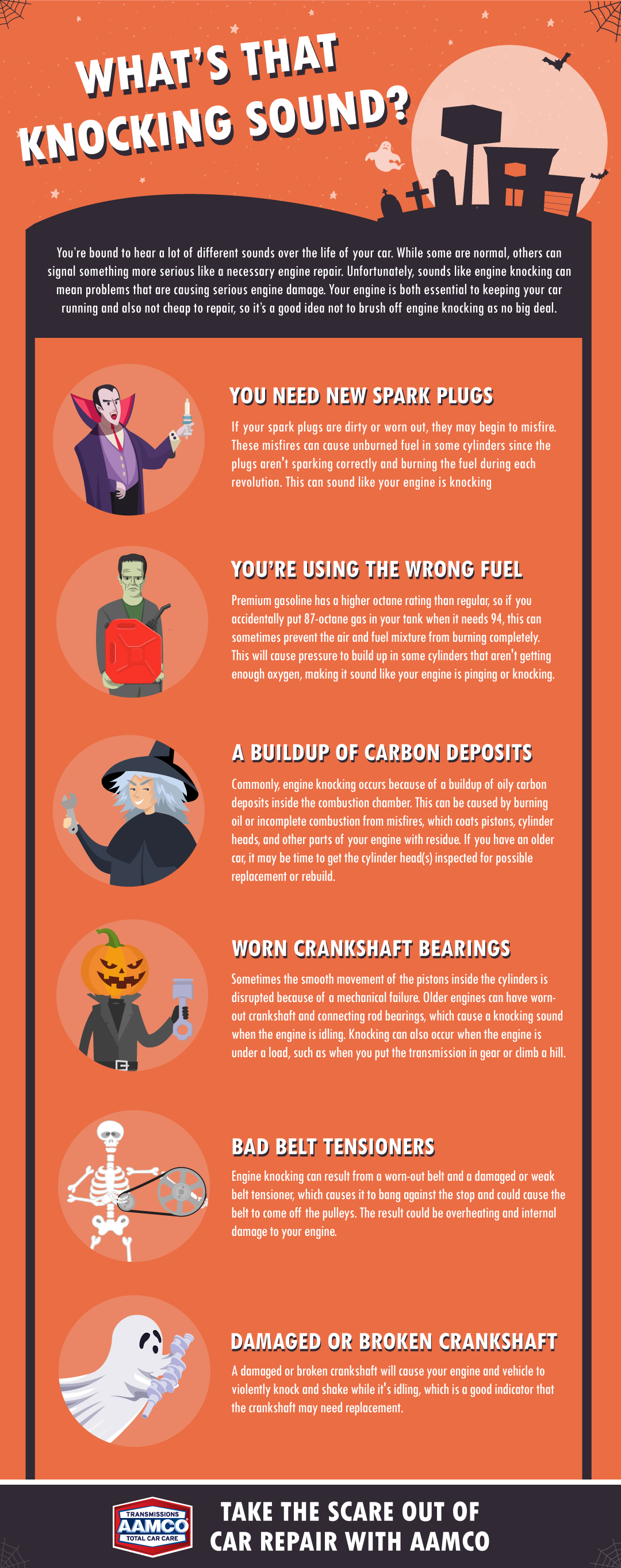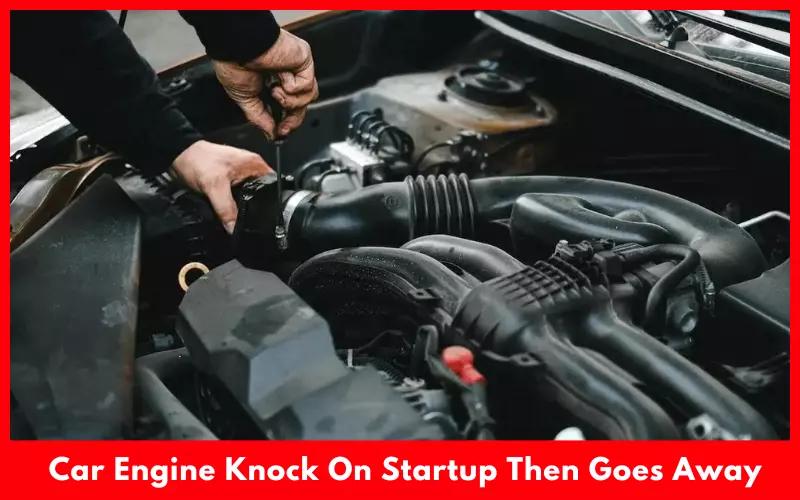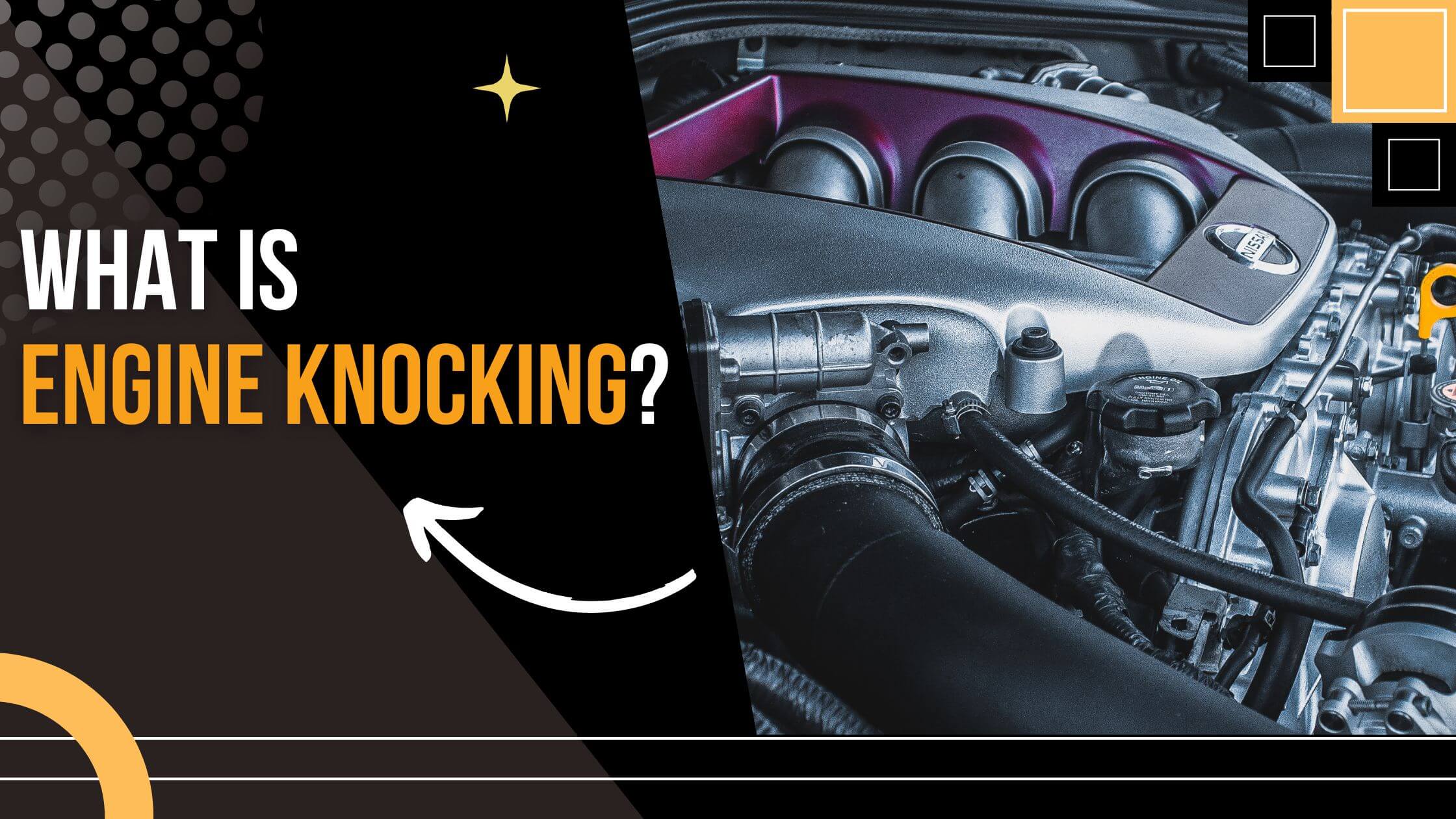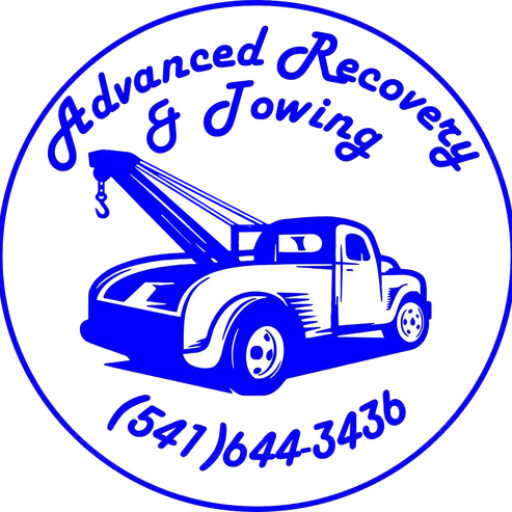Engine Knocking?
What to Do
You’re driving down the road, windows down, enjoying a beautiful day. Suddenly, you hear it—a persistent, rhythmic knocking sound coming from your engine. Panic sets in. Engine knocking isn’t just a minor inconvenience; it’s a clear signal that something is seriously wrong under the hood. Ignoring it can lead to expensive repairs and, worst-case scenario, a complete engine failure.
Key Takeaways
- Engine knocking is a sign of premature combustion in the cylinders.
- Common causes include low octane fuel, carbon buildup, and improper spark plugs.
- Immediate steps to take: upgrade your fuel, check your spark plugs, and consider a professional tune-up.

Understanding Engine Knocking
Engine knocking, also known as pinging or detonation, occurs when fuel combusts unevenly in your engine’s cylinders. This premature combustion leads to a knock or ping sound and can cause significant damage if left unchecked. The knock is an audible indication that your engine’s internal components are not operating smoothly and synchronously.
Why Engine Knocking Happens
-
Low Octane Fuel: Your engine is designed to run on fuel with a specific octane rating. Using lower-octane fuel can cause premature ignition, leading to knocking. High-performance engines are particularly sensitive to this and require premium fuels to avoid knocking.
-
Carbon Buildup: Over time, carbon deposits can accumulate inside your engine, reducing cylinder volume and increasing the pressure inside. These deposits can also create hot spots that ignite the fuel prematurely.
-
Improper Spark Plugs: Using the wrong type of spark plug can affect the ignition process. Spark plugs that are too hot can ignite the fuel too early, causing knocking.
Common Causes of Engine Knocking
| Cause | Description |
|---|---|
| Low Octane Fuel | Fuel ignites too early due to lower resistance to pressure. |
| Carbon Buildup | Increases cylinder pressure and creates hot spots. |
| Incorrect Spark Plugs | Spark plugs that are too hot or cold can disrupt the ignition process. |
| Lean Fuel Mixture | Insufficient fuel can cause higher combustion temperatures and knocking. |
| Faulty EGR Valve | EGR valve issues can lead to improper recirculation of exhaust gases, affecting combustion timing. |
| Timing Issues | Incorrect engine timing can lead to the fuel-air mixture igniting at the wrong time. |
For more details on how to address these causes, check out this guide on Family Handyman (Family Handyman) (Family Handyman).
What To Do When Your Engine Knocks
Step 1: Upgrade Your Fuel
Start by switching to a higher-octane fuel. High-octane fuels are less likely to ignite prematurely, which can help mitigate knocking. Additionally, using fuels with carbon-cleaning additives can help remove existing carbon deposits.
Step 2: Check Your Spark Plugs
Ensure you’re using the correct spark plugs for your vehicle. Consult your owner’s manual or a professional mechanic if you’re unsure. Replacing old or faulty spark plugs can significantly improve combustion efficiency and reduce knocking.
Step 3: Professional Tune-Up
Sometimes, a thorough engine tune-up is necessary. This can include adjusting the engine timing, cleaning the fuel injectors, and checking other vital components to ensure everything is functioning correctly.
Step 4: Regular Maintenance
Maintain a regular oil change schedule and keep an eye on your vehicle’s fluids. Low or dirty oil can contribute to knocking by failing to lubricate the engine properly.
For more comprehensive advice on handling engine knocking, refer to this article on CarParts.com (Family Handyman).
Avoiding Low Octane Fuel
Choosing the right fuel is critical for your vehicle’s performance. Always refer to your owner’s manual for the recommended octane rating. If you’re frequently hearing knocking, it might be worth upgrading to a higher-octane fuel even if your vehicle manual doesn’t require it.
| Octane Rating | Suitable For |
|---|---|
| 87 | Most standard engines |
| 89 | Mid-range for better performance |
| 91-93 | High-performance engines |
Learn more about the importance of using the correct fuel from this AAMCO blog (Family Handyman).

Real-Life Example: Towing Businesses and Engine Knocking
Imagine this: You run a busy towing business. One of your trucks starts to knock just as it’s about to tow a vehicle. This scenario can lead to not only costly repairs but also lost revenue from downtime. Regular maintenance and understanding the signs of engine knocking can save your business from these headaches.
Investing in higher-octane fuel and performing regular tune-ups ensures that your fleet remains reliable. This proactive approach not only extends the life of your vehicles but also maintains your business reputation.
Delving Deeper into Causes
While part 1 covered the basics, let’s explore some more intricate causes and solutions to engine knocking, particularly for towing businesses where reliability is crucial.
Fuel Quality Matters
Fuel quality isn’t just about octane ratings. Contaminated or poor-quality fuel can also cause knocking. It’s essential to purchase fuel from reputable stations and consider additives that clean your engine.
Timing and Sensors
Engine timing plays a critical role in preventing knocking. Modern vehicles use various sensors to adjust timing and fuel mixture dynamically. A faulty knock sensor can fail to detect knocking and prevent the engine management system from adjusting accordingly.
Example: Imagine a towing truck loaded with a heavy vehicle. The engine works harder, and if the knock sensor isn’t functioning, the engine might knock under the increased load, leading to severe damage.
Frequently Asked Questions (FAQs)
What is Engine Knocking?
Engine knocking is a phenomenon where fuel combusts unevenly in your engine’s cylinders. This premature combustion can cause a knocking or pinging sound, and if left unchecked, can lead to significant engine damage.
Can Low Octane Fuel Cause Engine Knocking?
Yes, low octane fuel can cause engine knocking. High-performance engines, in particular, require higher octane fuel to prevent premature ignition of the fuel-air mixture.
How Can I Prevent Engine Knocking?
To prevent engine knocking, use the recommended octane fuel, perform regular maintenance, and ensure your spark plugs and other engine components are in good condition. Additionally, using fuel additives to clean carbon deposits can help.
What Should I Do If My Engine Knocks?
If your engine knocks, immediately switch to higher octane fuel, check and replace spark plugs if necessary, and consider a professional tune-up. Addressing the issue early can prevent extensive damage.
Is Engine Knocking Dangerous?
Yes, engine knocking is dangerous. It indicates that combustion is occurring at the wrong time, which can damage pistons, cylinder walls, and crankshaft bearings.

Key Maintenance Tips for Towing Businesses
-
Regular Inspections: Ensure that your towing vehicles undergo regular inspections. Look for signs of wear and tear, particularly in the engine.
-
Quality Fuel: Always use high-quality fuel. Consider establishing relationships with reliable fuel suppliers to ensure the fuel quality is consistently high.
-
Professional Tune-Ups: Schedule professional tune-ups to check engine timing, fuel injectors, and other critical components. This proactive approach can identify potential issues before they become significant problems.
-
Training Drivers: Train your drivers to recognize the signs of engine knocking. Early detection can save thousands of dollars in repairs and prevent vehicle downtime.
Advanced Engine Care
Modern engines are complex, with advanced systems designed to prevent knocking. Here’s a breakdown of some components and their roles:
| Component | Function |
|---|---|
| Knock Sensor | Detects knocking and sends signals to the engine control unit (ECU) to adjust timing. |
| ECU | Adjusts engine parameters in real-time to optimize performance and prevent knocking. |
| Fuel Injectors | Ensure the right mix of fuel and air enters the combustion chamber. |
| Spark Plugs | Ignite the fuel-air mixture at the correct time for efficient combustion. |
| EGR Valve | Recirculates a portion of the exhaust gas to reduce combustion temperature and prevent knocking. |
Source: Detailed information on these components can be found in various automotive maintenance guides, including those on Family Handyman (Family Handyman) (Family Handyman) (Family Handyman).
External Resources for Further Reading
- What to Do When Your Engine Is Knocking – Family Handyman
- What To Do When Engine Sounds Give You the Chills – AAMCO Blog
- Engine Knocking Sound: What Does It Mean? – CarParts.com
Take Action: Prevention and Maintenance
By understanding the causes and taking preventive measures, you can keep your vehicles running smoothly and avoid the costly consequences of engine knocking. For towing businesses, this means fewer breakdowns, happier customers, and a healthier bottom line.
Quick Maintenance Checklist
- Fuel Quality: Always use high-octane, quality fuel.
- Regular Tune-Ups: Schedule periodic professional check-ups.
- Spark Plugs: Inspect and replace spark plugs regularly.
- Oil Changes: Maintain a strict oil change schedule.
- Engine Sensors: Ensure sensors are working correctly.
Following these steps can significantly reduce the risk of engine knocking and prolong the life of your fleet.
Engine knocking can be a serious issue, especially for towing businesses that rely on their vehicles for daily operations. By understanding the causes, taking preventive measures, and performing regular maintenance, you can ensure that your engines run smoothly and efficiently.
